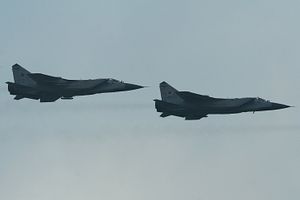Will we ever have a Chinese Tolkachev?
As detailed in David Hoffman’s Billion Dollar Spy, between 1979 and 1985, Soviet radar engineer Adolf Tolkachev turned his hatred of the Soviet regime into some of the most devastating industrial espionage ever conducted. Tolkachev took advantage of his position at the radar design firm Phazotron to make copies and photographs of volumes of material associated with Soviet radar and electronics systems. This gave the United States an inside look at the sensor capabilities of the USSR’s most advanced fighters and interceptors.
The impact of Tolkachev’s espionage was virtually incalculable. The material acquired helped to shift decisions and priorities within the U.S. defense-industrial complex, especially with regard to aerospace technology. It may have given the U.S. a massive, enduring advantage in aircraft effectiveness since the 1980s; understanding the limitations on how Soviet aircraft see the battlespace has made them much more vulnerable to U.S. attack than would otherwise have been the case.
The espionage was even, in broad terms, within the lines that the United States now declares should delineate “legitimate” espionage. The U.S. did not use the information it gained from Tolkachev to attempt to reverse engineer or copy any Soviet systems. It did not, in other words “violate” the intellectual property rights of major Soviet enterprises. Rather, the stolen data provided information on the capabilities and priorities of Soviet technology, thereby giving the United States a strategic advantage in developing its own tech. A fine distinction, perhaps, but one which the United States holds to today.
And so does China need to worry about its own Tolkachev? The idea that someone might play Snowden with a trove of Chinese military and electronic data, secreting away the details of the components of the J-20, or J-31, or Df-21, on a few thumbdrives is alternatively appealing or terrifying, depending on whether you work for Chinese intelligence.
But while the potential for a Tolkachev is real, the impact would likely be far less consequential. The Chinese national innovation system (NIS) shares some similarities with the old Soviet system, but has become far less centralized. The most sophisticated electronics come from a host of different firms, often carrying dual-use applications that make them accessible to the United States without the need for espionage.
Moreover, we know more about the Chinese NIS today than we ever knew about the Soviet. This is true not only of its output (we know more about the J-20 than we did about Soviet MiGs at similar stages of development), but also its internal processes; the Chinese system is more transparent and accessible than the Soviet one.
One of the things we do know is that Chinese military technology is not (yet) as competitive as that of the USSR during the height of the Cold War. The Chinese NIS has become adept at what amount to “architectural” innovations, reconfiguring existing systems in order to produce something new and effective, but has not generally achieved the kind of disruptive innovation that the USSR occasionally pushed for. This means that a Chinese Tolkachev has somewhat less to offer the United States. Of course, this will likely change over the next few years.
Finally, for all the warnings about Chinese theft of U.S. defense technology, the U.S. has its own formidable cyber-capabilities, and undoubtedly closely monitors the development of Chinese military technology. Indeed, the one area where a Chinese Tolkachev might have the most impact would be in the cyber-domain: a clear glimpse into the operations of the PLA’s corps of cyber-soldiers might prove very helpful, indeed.
And so the answer is “Yes, but.” Tolkachev could have the impact he did because he worked at the dawn of the era of digital knowledge. U.S. spies could miniaturize equipment to acquire technical data, but could not access that data themselves without direct human intervention. We can certainly still imagine the possibility that a disgruntled Chinese PLA employee could download reams of data on a thumb drive and pass it to the CIA, but we would likely find the information less surprising, and less strategically useful, than we did in the 1980s.

































